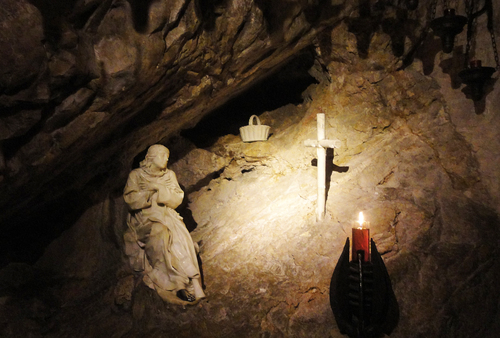 |
| Lorenzo Monaco UK National Gallery |
In the old Octave of St Benedict, the first Nocturn readings were as for the feast. The third Nocturn readings were a sermon of St John Chrysostom on Romans. The second Nocturn readings continued the reading of St Gregory's Dialogues book II, and were from chapters 35 and 37.
Reading 5: The man of God, Benedict, being diligent in watching, rose early before the time of matins (his monks being yet at rest) and came to the window of his chamber where he offered up Manuscript illustrationhis prayers to almighty God. Standing there, all of a sudden in the dead of the night, as he looked forth, he saw a light that banished away the darkness of the night and glittered with such brightness that the light which shone in the midst of darkness was far more clear than the light of the day.
During this vision a marvelously strange thing followed, for, as he himself afterward reported, the whole world, gathered together, as it were, under one beam of the sun, was presented before his eyes. While the venerable father stood attentively beholding the brightness of that glittering light, he saw the soul of Germanus, Bishop of Capua, in a fiery globe, carried up by Angels into heaven.
Reading 6: Then, desiring to have some witness of this notable miracle, he called Servandus the Deacon with a very loud voice two or three times by his name. Servandus, troubled at such an unusual crying out by the man of God, went up in all haste. Looking out the window he saw nothing else but a little remnant of the light, but he wondered at so great a miracle.
The man of God told him all that he had seen in due order. In the the town of Cassino, he commanded the religious man, Theoprobus, to dispatch someone that night to the city of Capua, to learn what had become of Germanus their Bishop. This being done, the messenger learned that the reverent prelate had departed this life. Enquiring curiously the time, the messenger discovered that he died at the very instant in which the man of God beheld him ascending up to heaven.
Reading 7: In the year that was to be his last, the man of God foretold the day of his holy death to a number of his disciples. In mentioning it to some who were with him in the monastery, he bound them to strict secrecy. Some others, however, who were stationed elsewhere he only informed of the special sign they would receive at the time of his death.
Six days before he died, he gave orders for his tomb to be opened. Almost immediately he was seized with a violent fever that rapidly wasted his remaining energy. Each day his condition grew worse until finally, on the sixth day, he had his disciples carry him into the chapel where he received the Body and Blood of our Lord to gain strength for his approaching end. Then, supporting his weakend body on the arms of his brethren, he stood with his hands raised to heaven and, as he prayed, breathed his last.
Reading 8: That day two monks, one of them at the monastery, the other some distance away, received the very same revelation. They both saw a magnificent road covered with rich carpeting and glittering with thousands of lights. From his monastery it stretched eastward in a straight line until it reached up into heaven. And there in the brightness stood a man of majestic appearance, who asked them, "Do you know who passed this way?"
"No," they replied.
"This, he told them, is the road taken by blessed Benedict, the Lord's beloved, when he went to heaven."
Thus, while the brethren who were with Benedict witnessed his death, those who were absent knew about it through the sign he had promised them. His body was laid to rest in the Chapel of St. John the Baptist, which he had built to replace the altar of Apollo.
That cave in which he first dwelled [at Subiaco], even to this very time, works miracles, if the faith of those that pray there requires the same.




